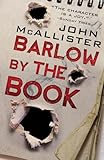John Barlow is the Royal Ulster Constabulary Station Sergeant in Ballymena, County Antrim. It’s 1960 and he is both respected and feared, depending on which part of Ballymena society you come from. Petty crooks fear his policing skills and intuition, but respect his fairness. Up-and-coming police officers who seek a shortcut to the top hate him for his gimlet eye, which can spot opportunism and obsequiousness at 50 paces.
The story begins with Barlow defusing a potential brawl between a group of university boys, home for the long vacation, and a few local lads who resent their assumption of privilege. What starts as a minor feud grows in proportion, and eventually casts a long shadow on the town. Meanwhile, Barlow’s wife has been inexplicably released from the secure mental hospital where she was committed after trying to cut him open with a kitchen knife. As he tries to manage her reappearance (and confiscate all the sharp knives from the kitchen drawer) Barlow does his best to meet the social and domestic aspirations of their daughter, Vera.
A ruthless gang of burglars target the homes of wealthy residents, but their greed doesn’t end there. With shotguns as the weapon of choice in Ballymena, innocent people die, and Vera herself becomes a victim. Barlow, however, is hamstrung. He has been suspended from duty after his efforts to expose a pickpocketing scam at a local point-to-point meeting. With his boss looking forward to Barlow’s impending downfall, and several of Ballymena’s nouveau riche anxious to see the back of the incorruptible officer, he can only rely on his raw but well-connected apprentice, Constable Wilson, and an aristocratic drunk who served in bomb disposal alongside Barlow during the war. The pursuit of the murderous burglars ends with a violent confrontation every bit as explosive as something out of a Jack Reacher novel.
A dozen or so pages into this book, I had resigned myself to reading a cosy but undemanding rural tale, with John Barlow being no more than an Ulster version of Dixon of Dock Green. I couldn’t have been more wrong. McAllister introduces some very dark elements into the story. We come across mental illness of the most dangerous sort, sexual repression and child abuse, against a background of rural deprivation. McAllister gives us an insight into a society where men and women are still bound together by the unique experiences of a recent war, but cruelly separated by class and the legacy of a brutal history. Back in 2013, we reviewed reviewed The Station Sergeant and this Barlow by the Book continues on the brand strengths which were evident there. The domestic details of Barlow’s life are fascinating, and we are given a salutary reminder that being a policeman in the United Kingdom was not always the well paid an occupation it is today.
I have just completed another novel where, by the last page, I was totally confused as to who had been killed, and by whom. With my head still spinning from that journey into confusion, I found this a welcome return to good old fashioned storytelling by a writer who doesn’t seek to baffle or present us with intentionally perverse tricks and twists. Do not make my initial mistake of thinking that this book is all sentimental whimsy with no gravity. This is an excellent read with thoroughly credible characters and a perfect mixture of darkness and light. I can thoroughly recommend it to readers who like fine writing, whatever the genre.
Barlow by the Book comes out 6 August. Irish crime fiction seems to be gaining more and more interest, to discover some other Irish authors click here.
Portnoy Publishing
Print/Kindle
£4.50
CFL Rating: 5 Stars











Historical crime fiction set in Ireland’s an interesting topic. It seems history is going to seep into just about any Irish crime, particularly that of the North. And it makes it all the more interesting, which might be why it looks like Irish crime fiction is gaining popularity. There was a panel on it held at this year’s crime fiction festival at Harrogate: http://www.crimefictionlover.co.uk/2015/07/harrogate-memories-2015/